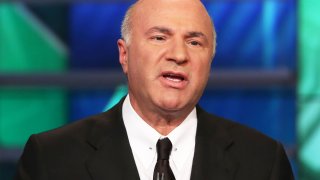
Ether, the second largest cryptocurrency by market value after bitcoin, hit a record high on Wednesday – but despite its rally, "it's always going to be No. 2" next to bitcoin, investor Kevin O'Leary tells CNBC Make It.
"I just believe that to be the case. Bitcoin will always be the 'gold.' Ethereum will always be the 'silver." And "that's not a bad thing necessarily," says O'Leary, who is chairman of O'Shares ETFs. (Ethereum is the blockchain that powers cryptocurrency ether.)
As O'Leary mentions, bulls view bitcoin as digital gold and a hedge against inflation that will appreciate over time.
In March, O'Leary announced that he allocated 3% of his portfolio to bitcoin, though he has owned the cryptocurrency, along with ether and a few other digital coins, since 2017. He made this move after Canada and a few other countries' regulators eased restrictions on institutional buying of the cryptocurrency, he says.
Get a weekly recap of the latest San Francisco Bay Area housing news. Sign up for NBC Bay Area’s Housing Deconstructed newsletter.
"Now, bitcoin hitting new highs almost every week is proving that there are interests being brought out of all kinds of institutions now trying to figure out: Is it a currency? Is it an asset? Is a property?" O'Leary says. "... That gives you an idea of the institutional and individual interest." (While bitcoin has continued to hit new highs, the cryptocurrency is volatile, so it also can plunge to lows rather quickly.)
In O'Leary's opinion, Ethereum is just "going to be used as a form of tracking and payment system."
But many Ethereum supporters would disagree and argue that the Ethereum blockchain is capable of more.
Money Report
Ethereum is known for its smart contracts, which are collections of code that carry out a set of instructions and run on the blockchain. The smart contracts power and build decentralized applications, like DeFi (or decentralized finance) apps, and NFTs (nonfungible tokens).
These capabilities and others are why Ethereum bulls, like billionaire investor Mark Cuban, are "excited" about its future.
"What really changed everything was smart contracts. That's what changed the game," Cuban said on a recent episode of "The Delphi Podcast." "That's why [Ethereum is] a lot like the internet," because applications can be built on it.
In fact, "I think it's the closest we have to a true currency," Cuban said.
And O'Leary did acknowledge the potential upside for Ethereum as it shifts to a new model.
By this, O'Leary is referring to an upgrade to the Ethereum blockchain called Ethereum 2.0, which launched in 2020 and has since been rolling out.
Investors say there are several benefits to Ethereum 2.0. First, it could make Ethereum faster — investors say the changes could allow several thousand more transactions per second on the blockchain, as CNBC reported. They also say it could be more secure.
In addition, as O'Leary points out, Ethereum 2.0 has the potential to be "far more green in terms of how much energy it takes to create it." (Currently, mining ether requires an enormous amount of electricity. But, for some very complicated reasons, the new model has the potential to require less computing power.)
But "will it ever take bitcoin? No," O'Leary says. "Bitcoin will always be the gold. Ethereum will always be the silver. There's something about being first that really keeps you ahead in a horse race like this."
Experts warn that investing in any cryptocurrency is very risky, because they are volatile and speculative. Some think cryptocurrency is also more susceptible to fraud, or that government regulations could hurt its value. There are also those who urge against cryptocurrency citing its carbon footprint. So experts advise that potential cryptocurrency investors should only spend what they can afford to lose.
Disclosure: CNBC owns the exclusive off-network cable rights to "Shark Tank."
Check out: Meet the middle-aged millennial: Homeowner, debt-burdened and turning 40
Don't miss:
- Mark Cuban on his cryptocurrency portfolio: 'I own a lot of Ethereum'
- Dogecoin millionaire invested his savings in the meme cryptocurrency with inspiration from Elon Musk
- Mark Cuban says bitcoin is far from its market top: 'The opportunity for it to go higher exists'






